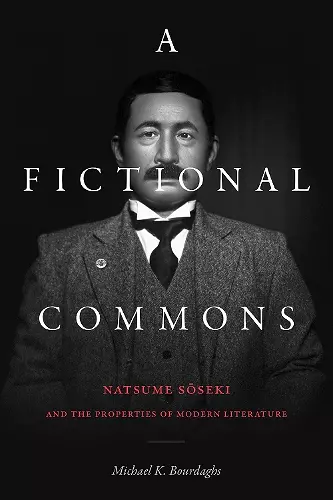A Fictional Commons
Natsume Soseki and the Properties of Modern Literature
Format:Hardback
Publisher:Duke University Press
Published:24th Sep '21
Currently unavailable, and unfortunately no date known when it will be back
This hardback is available in another edition too:
- Paperback£20.99(9781478014621)

Modernity arrived in Japan, as elsewhere, through new forms of ownership. In A Fictional Commons, Michael K. Bourdaghs explores how the literary and theoretical works of Natsume Sōseki (1867–1916), widely celebrated as Japan's greatest modern novelist, exploited the contradictions and ambiguities that haunted this new system. Many of his works feature narratives about inheritance, thievery, and the struggle to obtain or preserve material wealth while also imagining alternative ways of owning and sharing. For Sōseki, literature was a means for thinking through—and beyond—private property. Bourdaghs puts Sōseki into dialogue with thinkers from his own era (including William James and Mizuno Rentarō, author of Japan’s first copyright law) and discusses how his work anticipates such theorists as Karatani Kōjin and Franco Moretti. As Bourdaghs shows, Sōseki both appropriated and rejected concepts of ownership and subjectivity in ways that theorized literature as a critical response to the emergence of global capitalism.
“Michael K. Bourdaghs's A Fictional Commons provides a strikingly new approach to thinking about the fiction and theories of Natsume Sōseki as well as for thinking how literature as a practice gestures to something beyond the modern regime of private property. Literature, Bourdaghs demonstrates, is one of the sites where we imagine the return in a higher dimension of the commons, the gift, and primitive communism.” -- Karatani Kojin, author of * Isonomia and the Origins of Philosophy *
“Both erudite and innovative, A Fictional Commons brilliantly demonstrates how Natsume Sōseki, through his fiction and criticism, explored literature as a domain for imagining the alternatives to modern private property regime and the related conceptualization of modern personhood. It is a major contribution to Sōseki studies and modern Japanese literary studies. It also joins broader debates over the value of literature in the twenty-first century—how literature may inspire creative modes of sharing that traverse national, regional, and other boundaries dividing our troubled present.” -- Tomiko Yoda, Takashima Professor of Japanese Humanities, Harvard University
"As more and more people question the extremes of capitalism, Bourdaghs’ study of Soseki adds a fascinating lens for further examining other works of literature. . . . In A Fictional Commons, Bourdaghs reveals Soseki’s sharp mind, ever wrestling with the most important sociological issue of his time. Through this book, Bourdagh also reminds us that the role of literature is to rethink what is possible — and thereby literally rewrite the world." -- Kris Kosaka * Japan Times *
“[Bourdaghs] makes extensive use of Japanese and Western sources, both primary and secondary, drawing seamlessly on work in multiple languages. [A Fictional Commons] is extensively referenced and comes with an exhaustive list of bibliographic studies . . . which will be of immense help to both students and scholars interested in Sōseki, and in Meiji- and Taisho-era Japanese literature more broadly.” -- Gouranga Charan Pradhan * Japan Review *
“Bourdaghs’s exploration of the question of property for Sōseki is broad, trenchant, and productive, and it drew connections for me that I would not have otherwise imagined.” -- Edward Mack * Journal of Japanese Studies *
ISBN: 9781478013693
Dimensions: unknown
Weight: 476g
240 pages